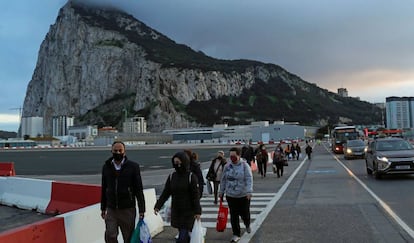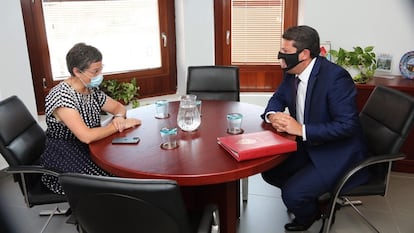Gibraltar to have border checks for UK arrivals, not for Spain, if deal is clinched
The role of European Frontex officers is the last hurdle to a last-minute agreement on the future relationship between the Rock and the surrounding area once the Brexit transition period ends

Under the terms of an agreement between Spain, Britain and Gibraltar that is in its last stages of negotiation, British nationals traveling to Gibraltar from the United Kingdom would have to go through passport control, while Spaniards would be able to enter freely and Gibraltarians would have open access to Spain and the other countries that are part of the Schengen Area, where border controls have been abolished. Gibraltar would not have a land border for people going into its territory, but it would have reinforced airport border controls.
This is the main practical consequence of a deal to define the British Overseas Territory’s relationship with Spain, whose southern province of Cádiz it borders, when the Brexit transition period ends on December 31. The last hurdle involves the role of the European Border and Coast Guard Agency (Frontex) in this future relationship.
If ongoing talks are successful, Gibraltar will for practical purposes join the Schengen Area, which allows the free movement of people across 26 European countries (22 members of the European Union plus Norway, Switzerland, Iceland and Liechtenstein). The UK was never a part of Schengen.
Spain’s Foreign Minister Arancha González Laya on Tuesday insisted that if there is no agreement on the future of Gibraltar, the latter will on January 1 become a EU external border “with all of its consequences.” This includes getting passports stamped upon entry to Spain, with exceptions made for registered cross-border workers.
The minister underscored that this is not what the Spanish government wants; instead, the offer on the table is de facto access to the Schengen area while seaport and airport access in Gibraltar would be controlled by Frontex officers reporting to Spanish authorities.

While London and Brussels continue their eleventh-hour negotiations to prevent a hard exit from the EU single market and customs union on January 1, there are parallel talks between Madrid and London – with Gibraltar included in the British delegation – to define the British Overseas Territory’s relationship with its Spanish and European surroundings starting next year.
At this second negotiating table, positions are now very close. All sides agree on guaranteeing the free movement of people across the Spanish-Gibraltarian border, in exchange for making Gibraltar’s airport and seaport the new EU external border.
This means that people landing in the Rock, as Gibraltar is popularly known, could later move freely across the Schengen Area without going through passport control. Gibraltarians have never had this kind of open access to Europe, as the UK never signed the Schengen agreement. From Gibraltar airport, it would also be possible to fly to the 26 members of Schengen.
The main sticking point is who will conduct these passport checks of people arriving in Gibraltar by sea or air. Spain has accepted that, for a transitional period at least, it will not be Spanish police officers but Frontex agents. The presence of Spanish police in Gibraltar was a red line for Chief Minister Fabian Picardo, and Spain has temporarily given up on this “visibility” in order to facilitate a deal. It would thus be up to Frontex officers and the Gibraltarian police to check the documents of passengers arriving in the British territory by sea or air.
Could there be a deal on Gibraltar without a general deal on Brexit? Sources say there could, but it would be more difficult
But Madrid is not giving up on its claim to have Frontex officers report back to Spanish authorities. Gibraltar wants the European agency to conduct its passport checks without any ties to Spain, but sources consulted by this newspaper said that this is not an option.
These sources noted that Frontex is a tool to support EU member states requesting aid in scenarios such as a surge in migrant arrivals. There are very few precedents for this agency’s use in ordinary border control tasks, although there was a case in the Balkans. In any event, it would require a formal request by an EU member state, in this case, Spain.
Secondly, said these sources, members of Schengen are responsible for preventing ineligible individuals from illegally entering the common area. Only Spain can perform this task in this particular case, as it is a member state of Schengen – the UK is not, while Gibraltar is not a state.
If these final differences are ironed out, Gibraltarians and visitors from the Schengen Area will benefit from the lack of controls at the land border. According to Picardo, there are around 30 million crossings every year, a third of which are made by cross-border workers.
As for freight, it will still have to go through customs and safety checks. Sources consulted by this newspaper said that this problem would be solved with inspection points located at some distance from the border to prevent traffic chaos. The Spanish Interior Ministry has released over €4 million to upgrade the customs facilities in La Línea de la Concepción (Cádiz), located just north of the border.
These sources insisted that both sides have made concessions, and that the key has been Spain’s willingness to temporarily put aside its sovereignty claims in order to reach a pragmatic deal that will be beneficial to all. In a radio interview on the Cadena SER radio network last Friday, Gibraltar’s Picardo said that “we are just a few short sentences away from a historic deal.”
Everyone is taking it for granted that the European Commission will accept whatever the sides agree to, but there could be misgivings in the event of a rough exit from the EU. Could there be a deal on Gibraltar without a general deal on Brexit? The same sources said there could, because they are different documents, but they also admitted that it would be more difficult.
English version by Susana Urra.
Tu suscripción se está usando en otro dispositivo
¿Quieres añadir otro usuario a tu suscripción?
Si continúas leyendo en este dispositivo, no se podrá leer en el otro.
FlechaTu suscripción se está usando en otro dispositivo y solo puedes acceder a EL PAÍS desde un dispositivo a la vez.
Si quieres compartir tu cuenta, cambia tu suscripción a la modalidad Premium, así podrás añadir otro usuario. Cada uno accederá con su propia cuenta de email, lo que os permitirá personalizar vuestra experiencia en EL PAÍS.
¿Tienes una suscripción de empresa? Accede aquí para contratar más cuentas.
En el caso de no saber quién está usando tu cuenta, te recomendamos cambiar tu contraseña aquí.
Si decides continuar compartiendo tu cuenta, este mensaje se mostrará en tu dispositivo y en el de la otra persona que está usando tu cuenta de forma indefinida, afectando a tu experiencia de lectura. Puedes consultar aquí los términos y condiciones de la suscripción digital.









































